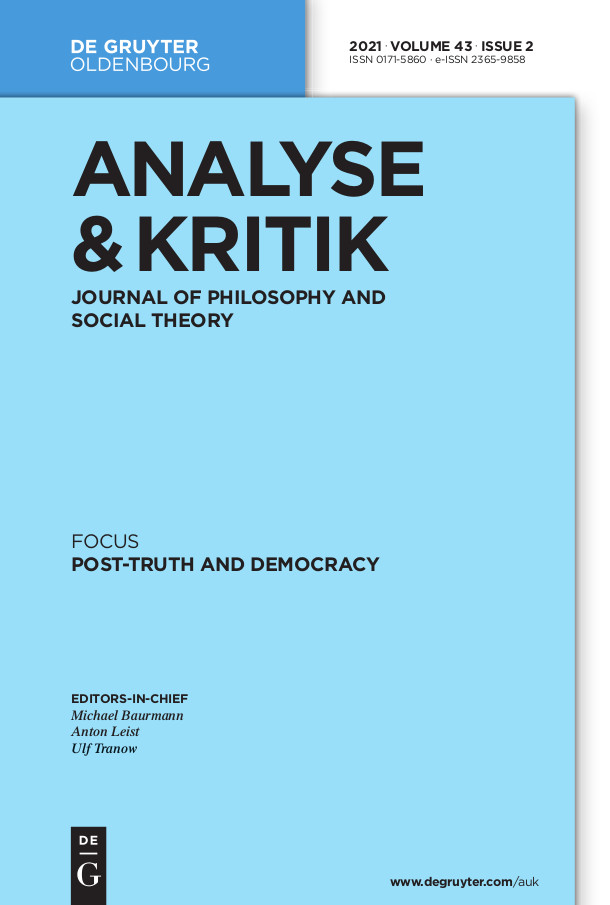Suchergebnisse
"Steve Fuller"
Titel: Expertise as a Form of Knowledge: A Response to Quast
Autor: Steve Fuller
Seite: 431-441
Christian Quast has presented what he describes as a ‘role-functional’ account of expertise as a form of knowledge that purports to take into account prior discussions within recent analytic social epistemology and allied fields. I argue that his scrupulousness results in a confused version of the role-functional account, which I try to remedy by presenting a ‘clean’ account that clearly distinguishes such an account from what Quast calls a ‘competence-driven’ one. The key point of my account is that ‘competence’ pertains to knowledge in closed systems and ‘expertise’ in open systems. I observe that the invocation of ‘reliability’ as an epistemic standard simply serves to confuse the difference between the competence-driven and role-functional accounts.
Titel: Democracy Naturalized: In Search of the Individual in the Post-truth Condition
Autor: Steve Fuller
Seite: 351-366
This article takes a ‘naturalistic’ look at the historically changing nature of the individual and its implications for the terms on which democracy might be realized, starting from classical Athens, moving through early debates in evolutionary theory, to contemporary moral and political thought. Generally speaking, liberal democracy sees individuality as the mark of an evolutionarily mature species, whereas socialist democracy sees it as the mark of an evolutionary immature species. Overall, the individual has been ‘de-naturalized’ over time, resulting in the indeterminate figure who thrives in the post-truth condition.
Titel: Behind the Screens: Post-truth, Populism, and the Circulation of Elites
Autor: William T. Lynch
Seite: 367-393
The alleged emergence of a ‘post-truth’ regime links the rise of new forms of social media and the reemergence of political populism. Post-truth has theoretical roots in the interdisciplinary field of Science and Technology Studies (STS), with sociologists of science arguing that both true and false claims should be explained by the same kinds of social causes. Most STS theorists have sought to deflect blame for post-truth, while at the same time enacting a normative turn, looking to deconstruct truth claims and subject expertise to criticism. Steve Fuller has developed a positive case for post-truth in science, arguing that post-truth democratizes science. I criticize this argument and suggest an alternative approach that draws on the prehistory of the field in the 1930s and 1940s, when philosophers and sociologists sought to define the social conditions necessary for reliable knowledge production that might stem mass media irrationalism.
Titel: Symmetry as a Guide to Post-truth Times: A Response to Lynch
Autor: Steve Fuller
Seite: 395-411
William Lynch has provided an informed and probing critique of my embrace of the post-truth condition, which he understands correctly as an extension of the normative project of social epistemology. This article roughly tracks the order of Lynch’s paper, beginning with the vexed role of the ‘normative’ in Science and Technology Studies, which originally triggered my version of social epistemology 35 years ago and has been guided by the field’s ‘symmetry principle’. Here the pejorative use of ‘populism’ to mean democracy is highlighted as a failure of symmetry. Finally, after rejecting Lynch’s appeal to a hybrid Marxian–Darwinism, Carl Schmitt and Thomas Hobbes are contrasted en route to what I have called ‘quantum epistemology’.
Titel: Does Post-truth Expand or Restrict Political Choice? Politics, Planning, and Expertise in a Post-truth Environment
Autor: William T. Lynch
Seite: 137-159
Steve Fuller has replied to my critique of his endorsement of a post-truth epistemology. I trace the divergence in our approach to social epistemology by examining our distinct responses to the principle of symmetry in the sociology of scientific knowledge. Fuller has extended the concept of symmetry and challenged the field to embrace a post-truth condition that flattens the difference between experts and the public. By contrast, I have criticized the concept of symmetry for policing the field to rule ideology critique out of court. I argue that a focus on post-truth populism obscures the role of counter-elites and ideologies that restrict political choice. A better way to promote democracy would be to support minority positions within science that promise to open up suppressed political possibilities and to seek the coordinated use of different disciplines to address significant public problems.
Titel: Symmetry in World-Historic Perspective: Reply to Lynch
Autor: Steve Fuller
Seite: 161-169
William Lynch has persistently questioned the politics underlying my appeal to science and technology studies’ flagship symmetry principle. He believes that it licenses the worst features of the ‘post-truth condition’. I respond in two parts, the first facing the future and the second facing the past. In the first part, I argue that the symmetry principle will be crucial in decisions that society will increasingly need to make concerning the inclusion of animals and machines on grounds of sentience, consciousness, intelligence, etc. In the second part, I argue that the symmetry principle has been in fact at the core of the ‘justice as fairness’ idea that has been at the core of both liberal and socialist democracies. Difficulties start once the means of expression and communication are made widely available and the standards of fairness are subject to continual questioning and renegotiation.

Focus: Post-truth and Democracy
2021 (43) Heft 2
Editorial
The concept of ‘post-truth’ has existed for a while, but after the Oxford dictionary named it ‘word of the year’ in 2016, it has permeated public and academic debates. Since then, it has become synonymous with the populist threat to the liberal-democratic order. The concept points to the impression that we are entering an age of decay in which the achievements of modernity—objectivity, science, rationality, and democracy—are being gradually replaced by emotionality, agnotology, irrat...